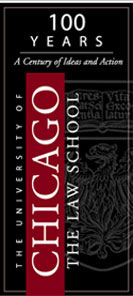|
During my first very week as a young faculty member, a few of
us had an informal lunch in Hyde Park. It wasn't one of those
famous Quadrangle Club lunches, but it was just as intense. I
remember that Dick Posner and Frank Easterbrook (not judges yet)
were seated across from me, and they were asking my opinion on
some large and difficult legal issues. In my late twenties at
the time, I said, very firmly, what I thought. We spent the next
hour discussing my views (which were undoubtedly very stupid).
I had such a mixture of feelings! It was clear that Dick and Frank
thought that I was wrong and that it was almost unbelievable that
I thought as I did. But it was equally clear -- even more clear
-- that they thought it was extremely important to hear me out,
to exchange reasons, to treat me respectfully, entirely as an
equal.
This little story seems to me to capture a great deal about the
University of Chicago Law School. Ideas are taken on their merits,
not because of who says them. Nobel Prize winners, at lunch and
at the classroom, are certainly listened to, but they're never
seen as "authorities." To an amazing degree, there's
no such thing as political correctness, of the right-wing or the
left-wing kind. We have a bunch of individuals and individualists,
to be sure, but they live their lives in a community, and they're
entirely dedicated to it.
While Chicago is undoubtedly the most intense and intellectual
of American law schools, it's no ivory tower. In fact I think
the law school's greatest contribution, at least in the last forty
years or so, has been to focus attention, at every stage, on the
real-world consequences of law. Does the minimum wage really help
poor people? What about rent control? Is the earned income tax
credit more effective as a way of reducing poverty? Suppose that
we want to make the air cleaner. What strategies will actually
help to achieve that goal? And if pollution control has unfortunate
effects -- by, for example, increasing prices or decreasing wages
-- might it be possible to come up with new and better approaches?
Because we always need to know the actual effects of law, it's
no surprise that ideas from this institution have played a significant
role in both Republican and Democratic administrations.
Much of my own work has involved the theory of constitutional
democracy, and in particular the idea of deliberative democracy
-- a system that combines political accountability and a commitment
to reason-giving, and that sees disagreement among political equals
not as threatening, but as a constructive force. And I do believe
that the ideal of deliberative democracy is the organizing principle
for our constitutional system. But my own experience with that
ideal has come, above all, from the University of Chicago Law
School, where disagreement among equals is a constructive force,
and where reason-giving is a fact of daily life. |



